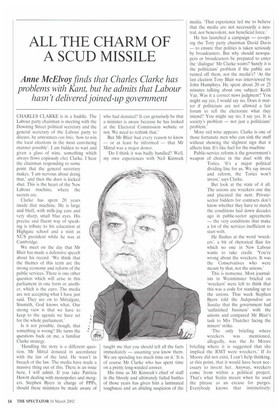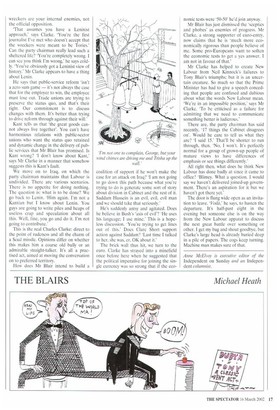ALL THE CHARM OF A SCUD MISSILE
Anne McElvoy finds that Charles Clarke has
problems with Kant, but he admits that Labour hasn't delivered joined-up government
CHARLES CLARKE is in a huddle. The Labour party chairman is meeting with the Downing Street political secretary and the general secretary of the Labour party to discuss, he announces con brio, 'how to win the local elections in the most convincing manner possible'. I am bidden to wait and given a glass of wine, something which always flows copiously chez Clarke. I hear the chairman responding to some point that the general secretary makes, 'I am nervous about doing that,' and then the door is kicked shut. This is the heart of the New Labour machine, where the secrets are.
Clarke has spent 20 years inside that machine. He is large and bluff, with milk-jug ears and very sharp, small blue eyes. His precise and fluent way of speaking is tribute to his education at Highgate school and a stint as NUS president while he was at Cambridge.
We meet on the day that Mr Blair has made a defensive speech about his record. 'We think that the themes of this term are the strong economy and reform of the public services. There is one other question which will arise in this parliament in one form or another, which is the euro. The media are not accepting what I have just said. They are on to Mittalgate, Sixsmith, God knows what. Our strong view is that we have to keep to the agenda we have set for the whole parliament.'
Is it not possible, though, that something is wrong? He turns the questions back on me, a familiar Clarke strategy, 'Handling the story is a different question. Mr Mittal donated in accordance with the law of the land. He wasn't in breach of the law. The media have made a massive thing out of this. There is an issue here, I will admit. If you take Patricia Hewitt dealing with monopolies and mergers, Stephen Byers in charge of PPPs, should these ministers be made aware of who had donated? It can genuinely be that a minister is aware because he has looked at the Electoral Commission website or not. We need to rethink that.'
But Mr Blair had every reason to know — or at least be informed — that Mr Mittal was a major donor.
'Do I think it was badly handled? Well, my own experiences with Neil Kinnock taught me that you should tell all the facts immediately — assuming you know them. We are spending too much time on it.' It is of course Mr Clarke who has spent time on a pretty long-winded answer.
His time as Mr Kinnock's chief of staff in the bloody and ultimately failed battles of those years has given him a laminated toughness and an abiding suspicion of the media. 'That experience led me to believe that the media are not necessarily a neutral, nor benevolent, nor beneficial force.'
He has launched a campaign — co-opting the Tory party chairman David Davis — to ensure that politics is taken seriously by broadcasters. But why should newspapers or broadcasters be prepared to enter the 'dialogue' Mr Clarke wants? Surely it is the politicians' problem if the public are turned off them, not the media's? 'At the last election Tony Blair was interviewed by John Humphrys. He spent about 20 or 25 minutes talking about one subject: Keith Vaz. Was it a correct news judgment? You might say yes, I would say no. Does it matter if politicians are not allowed a fair forum to tell the electorate what they intend? You might say no; I say yes. It is society's problem — not just a politicians' problem.'
More red wine appears. Clarke is one of those fortunate men who can sink the stuff without showing the slightest sign that it affects him. It's like fuel for the machine Public-service reform is the government's weapon of choice in the duel with the Tories. 'It's a major political dividing line for us. We say invest and reform, the Tories won't invest,' says Clarke.
But look at the state of it all. The unions are wreckers one day and placated the next. Privatesector bidders for contracts don't know whether they have to match the conditions laid down decades ago in public-sector agreements — the very conditions that make a lot of the services inefficient to start with.
He flushes at the word 'wreckers', a bit of rhetorical flair for which no one in New Labour wants to take credit. 'You're wrong about the wreckers. It was the Conservatives who were meant by that, not the unions.'
This is nonsense. Most journalists in Westminster briefed on 'wreckers' were left to think that this was a code for standing up to the unions. That week Stephen Byers told the Independent on Sunday that the government had 'unfinished business' with the unions and compared Mr Blair's task to Mrs Thatcher facing the miners' strike.
The only briefing where wreckers was mentioned, allegedly, was the Jo Moore briefing where it is suggested that she implied the RMT were wreckers.' If Jo Moore did not exist, I can't help thinking, at this point, that it would have been necessary to invent her. Anyway, wreckers come from within a political project. That's what Stalin meant when he used the phrase as an excuse for purges. Everybody knows that instinctively: wreckers are your internal enemies, not the official opposition.
'That assumes you have a Leninist approach,' says Clarke. 'You're the first journalist I've met who doesn't accept that the wreckers were meant to be Tories.' Can the party chairman really lead such a sheltered life? 'You're completely wrong. I can see you think I'm wrong,' he says coldly. 'You've obviously got a Leninist view of history.' Mr Clarke appears to have a thing about Lenin.
He says that public-service reform 'isn't a zero sum game — it's not always the case that for the employer to win, the employee must lose out. Trade unions are trying to preserve the status quo, and that's their right. Our commitment is to discuss changes with them. It's better than trying to drive reform through against their will.'
Kant tells us that 'the great goods cannot always live together'. You can't have harmonious relations with public-sector unions who want the status quo retained and dynamic change in the delivery of public services that Mr Blair has promised. Is Kant wrong? 'I don't know about Kant,' says Mr Clarke in a manner that somehow suggests this is Kant's fault.
We move on to Iraq, on which the party chairman maintains that Labour is undivided. There are various scenarios. There is no appetite for doing nothing. The question is: what is to be done? We go back to Lenin. 'Him again. I'm not a Kantian but I know about Lenin. You guys are going to write piles and heaps of useless crap and speculation about all this. Well, fine, you go and do it. I'm not going to contribute.'
This is the real Charles Clarke: direct to the point of rudeness and all the charm of a Scud missile. Opinions differ on whether this makes him a coarse old bully or an admirable straight-talker. It's all a practised act, aimed at moving the conversation on to preferred territory.
How does Mr Blair intend to build a coalition of support if he won't make the case for an attack on Iraq? 'I am not going to go down this path because what you're trying to do is generate some sort of story about division in Cabinet and the rest of it. Saddam Hussein is an evil, evil, evil man and we should take that seriously.'
He's suddenly antsy and agitated. Does he believe in Bush's 'axis of evil'? 'He uses his language; I use mine.' This is a hopeless discussion. 'You're trying to get lines out of this.' Does Clare Short support action against Saddam? 'Last time I talked to her, she was, er, OK about it.'
The brick wall thus hit, we turn to the euro. Clarke has strayed into a minefield once before here when he suggested that the political imperative for joining the single currency was so strong that if the eco nomic tests were '50-50' he'd join an way.
Mr Blair has just dismissed the 'sceptics and phobes' as enemies of progress. Mr Clarke, a strong supporter of euro-entry, now claims that he is 'much more economically rigorous than people believe of me. Some pro-Europeans want to soften the economic tests to get a yes answer. I am not in favour of that.'
Mr Clarke has helped to create New Labour from Neil Kinnock's failures to Tony Blair's triumphs; but it is an uncertain creature. So much so that the Prime Minister has had to give a speech conceding that people are confused and dubious about what the words New Labour mean. 'We're in an impossible position,' says Mr Clarke. `To be criticised as a failure for admitting that we need to communicate something better is ludicrous.'
There are, the party chairman has said recently, '17 things the Cabinet disagrees on'. Would he care to tell us what they are? 'I said 15.' That'll be shorter to run through, then. 'No, I won't. It's perfectly normal for a group of grown-up people of mature views to have differences of emphasis or see things differently.'
All right then, what does he think New Labour has done badly at since it came to office? `Blimey. What a question. I would say we haven't delivered joined-up government. There's an aspiration for it but we haven't got there yet.'
The door is flung wide open as an invitation to leave. 'Voila,' he says, to hasten the departure. It's half-past eight in the evening but someone else is on the way from the New Labour apparat to discuss the next great battle over something or other. I get my bag and shout goodbye, but Clarke's large head is already buried deep in a pile of papers. The cogs keep turning. Machine man makes sure of that.
Anne McElvoy is executive editor of the Independent on Sunday and an Independent columnist.

















































































 Previous page
Previous page